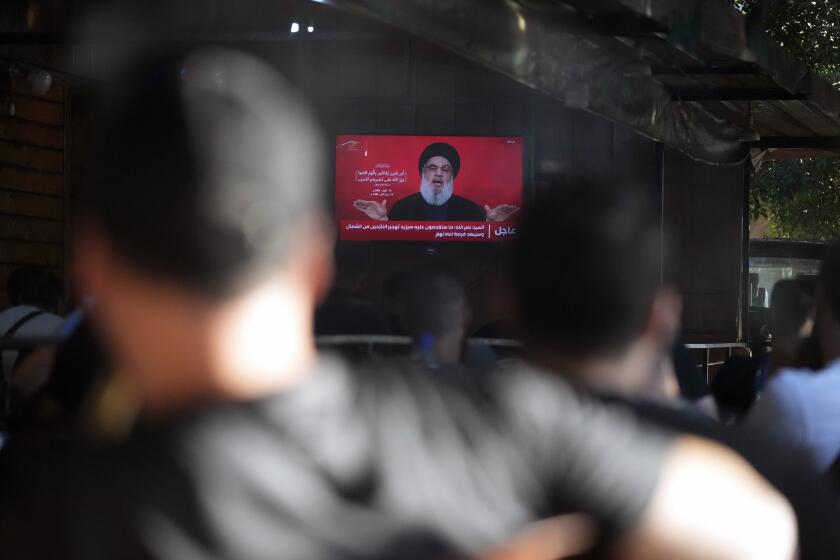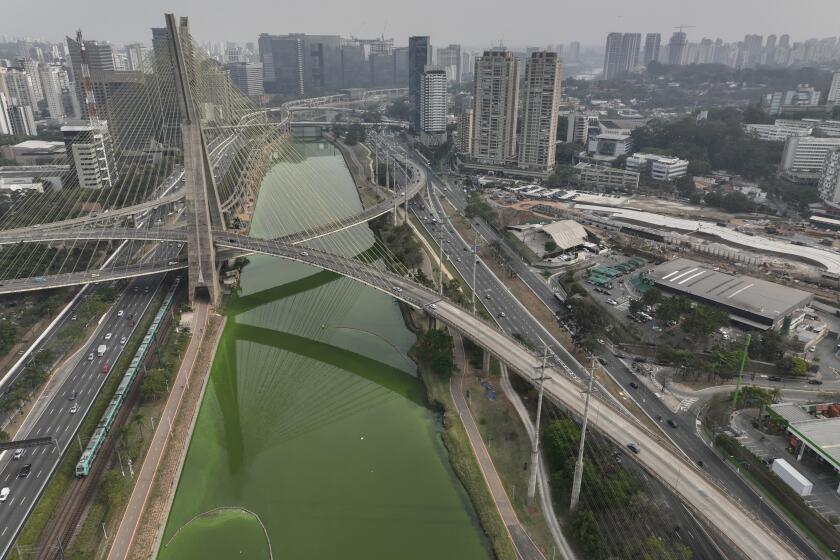Favored immigrants getting help
Twice in the last two years, Congress tried to overhaul the nation’s immigration laws and failed, leaving the explosive issue for dead. But during an election year in which no action was expected, the House and Senate now are quietly helping certain groups of immigrants favored by both ends of the political spectrum.
Even in polarized Washington, Democrats and Republicans can appreciate immigrants who throw a fast pitch, have a beautiful face or sing a catchy song. Bills to make it easier for athletes, fashion models and performers, such as British singer Amy Winehouse, to work in the United States have enthusiastic support, even from some of the most hard-nosed immigration critics.
Congress has been able to make incremental changes to immigration laws, despite its overall paralysis, by focusing on narrow issues on which compromise proved possible.
Immigration bills still being considered in the House cover foreign students, religious workers, foreign investors and relatives of a few illegal immigrants killed in the Sept. 11 terrorist attacks. Other measures are planned.
“It’s the art and age of compromise, especially on an issue this sensitive and this important,” said Rep. Lamar Smith (R-Texas), the ranking member on the House immigration subcommittee who is known for his conservative views on the subject.
The reason these bills can be approved, said the subcommittee’s chairwoman, Rep. Zoe Lofgren (D-San Jose), is that they are more “housekeeping items” than substantial reform. Though important, Lofgren said, the bills are not “part of the overall immigration debate; therefore, the contentious nature of the discussion is less.”
In 2007, the Senate failed to pass an enormous bill that sought to make changes to border security, work site enforcement and a guest-worker program. It also would have allowed illegal immigrants to gain legal status, a provision that led to the bill’s collapse after opponents labeled it amnesty.
Since then, Lofgren has steered the immigration subcommittee toward agreement on small issues and, with Smith, passed the bills with wide support.
The House approved a bill this month that would speed visa processing for foreign artists and musicians. Winehouse had to appear via satellite at this year’s Grammy ceremony because there was not enough time to process her visa after she was cleared to enter.
“The visa process is so onerous, I have seen a decline in foreign artists appearing here, and this is honestly the reason why,” said Renae Williams, director of Dance Presentations at the Music Center in Los Angeles.
The ARTS (Arts Require Timely Service) Act, sponsored by Rep. Howard L. Berman (D-Valley Village), would give the Department of Homeland Security a 30-day window to process visas for performers and their crews. If it failed to meet that deadline, it would have to offer 15-day expedited processing free to artists invited by a nonprofit organization.
Rep. Dan Lungren (R-Gold River) backed the bill based on memories of his now-90-year-old mother taking him and his six siblings to the Long Beach Symphony Orchestra on Sunday nights. “I remember the challenge of getting visiting artists there,” he said.
But Lungren, who cosponsored a 2007 bill that would have denied citizenship to babies born to illegal immigrants, acknowledged, “You do have to clear the minefield of immigration when you do these things. Once people realized that we were not talking about people coming here to stay for an appreciable period of time, it was fine,” he said.
Foreign athletes who want to stay in the U.S. for many years say that it has gotten more difficult. “Before 9/11, everyone understood that we’re ballplayers and that we needed papers to come here,” said Chan Ho Park, the Dodgers pitcher from South Korea. “After 9/11, they made it tighter and more difficult.”
Park knows players who have had trouble getting to spring training because their visas had not come through. To make sure he was in the U.S. on time for training this year, Park came early on a tourist visa before switching to a P1 visa for professional athletes.
A bill sponsored by Rep. Linda Sanchez (D-Lakewood), a self-described “radical, die-hard baseball fan,” would ease restrictions on professional athletes by lifting the 10-year cap on their visas. After 10 years on a P1 visa, professional athletes have to either leave the country or become permanent residents, which is not easy for minor league players.
“In baseball, people can spend 10 years in the minors honing their game,” Sanchez said. “To force them out when they’re hitting their game is just not fair.”
The bill would help not only baseball players, but also players with the National Hockey League and the National Basketball Assn.
On opening day this year, 28% of major league players and 47.8% of minor league players were born outside the United States. “Baseball is a global game,” said Jimmie Lee Solomon, vice president of baseball operations for Major League Baseball. “There could be quite a sizable segment of our players who would be forced to prematurely cut off their careers, and that would be a detriment to the sport and all those who love the game of baseball.”
The judiciary committee unanimously approved Sanchez’s bill, which will soon go to the House floor and then the Senate. “The Senate has to have a bunch of sports fans, so I’m sure we’ll find support,” Sanchez said.
Smith gave the bill his wary backing. “One of my goals is that we diminish as much as possible the prospects for fraud,” he said. “Few athletes have careers going longer than 10 years. . . . There aren’t many Cal Ripkens. I’ll be watching that.”
Smith also has his eye on a bill that would create a new visa category for fashion models.
Supermodels, such as Brazil’s Gisele Bundchen, can apply for visas for “aliens with extraordinary ability” by submitting documentation that attests to their skills. But in a real-life twist on the TV show “Beauty and the Geek,” less established models must vie for the same visas as highly skilled workers, such as engineers and programmers.
Only 65,000 of those H-1B visas are issued new every year, and high-tech companies have lobbied Congress hard to get more, an unlikely prospect in an election year.
Rep. Anthony Weiner (D-N.Y.) proposed a solution that could address Silicon Valley’s hunger for skilled foreigners and benefit his city’s fashion industry. His bill would create a new category for those models, probably limited to about 1,000 five-year visas, and would free up H-1B visas for more engineers.
Smith, 60, has reservations.
He said he could picture Weiner (who is single, handsome and 43) “in a posh downtown New York City hotel celebrating the passage of this bill surrounded by hundreds of energized, wildly ecstatic fashion models. And you know for a fact he’s going to have an annual celebration. It’s almost too much to bear.”
Smith paused. “But not too much to oppose the bill.”
--
--
Times staff writer Dylan Hernandez contributed to this report from Cincinnati.
More to Read
Sign up for Essential California
The most important California stories and recommendations in your inbox every morning.
You may occasionally receive promotional content from the Los Angeles Times.










